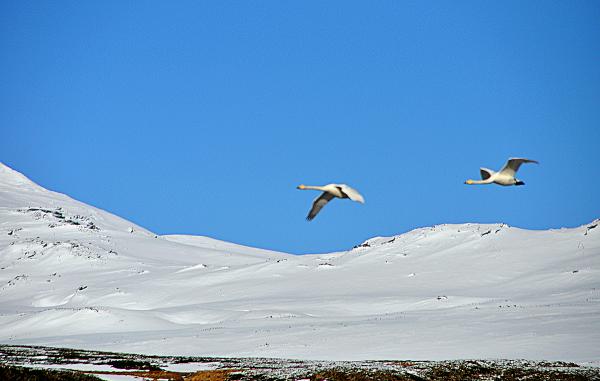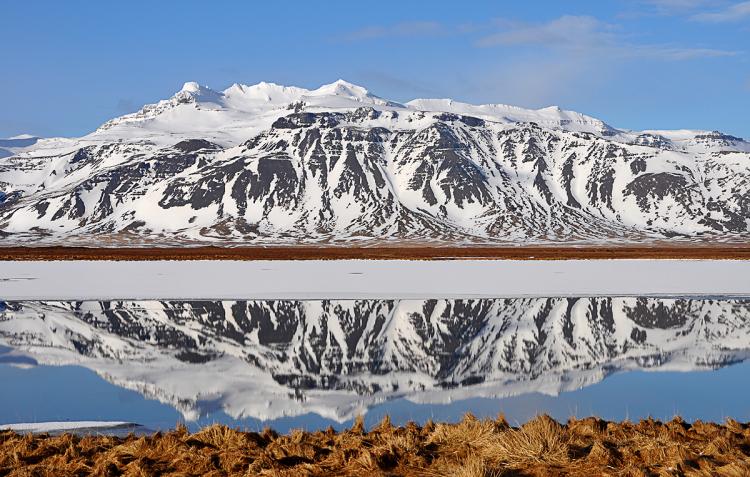Wo und wann hinterließ Liebe zur Natur erste literarische Spuren?
‟I could not say when I first grew to love the wild, only that I did, and that a need for it will always remain strong in me. As a child, whenever I read the word, it conjured images of wide spaces... isolated islands off Atlantic coasts.” –
Sind das wirklich die Worte eines anderen?

Auch die irokeltischen Mönche am Nordwestrand Europas verließen die Zivilisation und zogen so weit hinaus, wie sie konnten. Einige kamen in unglaublichen, winzigen, nur mit Leder bespannten Booten (curraghs) sogar bis nach Island. Auch sie suchten Gott in der Einsamkeit, aber sie fanden etwas anderes: Sie entdeckten die Schönheit der wilden, ungezähmten Natur, die sie umgab und der sie sich aussetzten.
Etliche von ihnen hielten Eindrücke, Momente ihres Naturerlebens in Versen fest. Der irische Einsiedlermönch Marban zum Beispiel, der im 7. Jahrhundert lebte, stimmte, von seinem ri (König) nach dem Grund für sein Leben in der Einsamkeit der Wildnis befragt, geradezu ein Hohelied auf die Natur an:
The voice of the wind against the branchy wood
Upon the deep-blue sky,
Falls of the river, the note of the swan,
Delightful music...
(Übersetzung: Kuno Meyer: Ancient Gaelic Poetry
s. auch: Kenneth Hurlstone.Jackson: A Celtic Miscellany, 1971)
Der Lärm der entbrennenden Schlacht läßt Sweeney in Wahnsinn verfallen, ‟and darkness, and fury, and giddiness, and frenzy, and flight, unsteadiness, restlessness, and unquiet filled him, likewise disgust with every place in which he used to be and desire for every place which he had not reached. His fingers were palsied, his feet trembled, his heart beat quick, his senses were overcome, his sight was distorted, his weapons fell naked from his hands, so that through Ronan's curse he went, like any bird of the air, in madness and imbecility... it was seldom that his feet would touch the ground because of the swiftness of his course, and when he did touch it he would not shake the dew from the top of the grass for the lightness and the nimbleness of his step.” – ‟For a long time thereafter he was (faring) throughout Ireland, visiting and searching in hard, rocky clefts and in bushy J branches of tall ivy-trees, in narrow cavities of stones, from estuary to estuary, from peak to peak, and from glen to glen.”
Anfangs stimmt er in seinen Schlafbäumen (meist immergrüne und langlebige, aber auch giftige Eiben, aus denen halluzinogene Alkaloide gewonnen wurden. Bei den Kelten galten sie als heilige Bäume, die in Verbindung mit dem Totenreich standen) die Hiobsklagen an, doch als er wieder einmal den Klang einer Kirchenglocke hört, sagt er, daß ihm der Ruf des Kuckucks in den Wäldern lieber sei.
‟From Loch Diolair of the cliff
to Derry Coluim Cille
it was not strife that I heard
from splendid, melodious swans.
The belling of the stag of the desert above the cliffs
in Siodhmuine Glinne—
there is no music on earth
in my soul but its sweetness.”
‟O holly, little sheltering one,
thou door against the wind;
o ash-tree, thou baleful one,
hand-weapon of a warrior.
O birch, smooth and blessed,
thou melodious, proud one,
delightful each entwining branch
in the top of thy crown...
Going through the ivy-trees —
I conceal it not, O warrior —
like good cast of a spear
I went with the wind.”
‟I love not the merry prattle
that men and women make:
sweeter to me is the warbling
of the blackbird in the quarter in which it is. –
water is my mead, my trees hard and bare or close-sheltering are my friends.”
 Gegen Ende seines Lebens wird Sweeney der harten Umstände seine Herumirrens verständlicherweise müde, doch selbst in die alte Heimat zurückkommend verläßt ihn die Liebe zur Natur nicht:
Gegen Ende seines Lebens wird Sweeney der harten Umstände seine Herumirrens verständlicherweise müde, doch selbst in die alte Heimat zurückkommend verläßt ihn die Liebe zur Natur nicht:
‟Water of bright Glen Bolcain,
listening to its many birds;
its melodious, rushing streams,
its islands and its rivers.
Its sheltering holly and its hazels,
its leaves, its brambles, its acorns,
its delicious, fresh berries,
its nuts, its refreshing sloes.
The number of its packs of hounds in woods,
the bellowing of its stags,
its pure water without prohibition;
'tis not I that hated it.”
Sweeney verharrt seinerseits bis zum Ende in seiner antikirchlichen Haltung. Einmal begegnet er einem Mönch, der ihm seinen Psalter vorhält:
‟Delightful is the leaf of this book,
the psalter of holy Kevin.
Suibhne: More delightful is a leaf of my yew
in happy Glen Bolcain.”
Wie wirst du dein Leben enden, fragt ihn der Mönch. ‟Dein Schweinehirt wird mich eines frühen Morgens töten”, antwortet Sweeny. Doch gegen eine tägliche Mahlzeit erklärt er sich bereit, den Mönch wieder zu besuchen, damit der seine Geschichte aufschreiben kann. Eines Morgens durchbohrt ihn der Mann der Köchin (und Schweinehirt des Mönchs) eifersüchtig mit seinem Speer.
Sweeney stimmt sein Sterbelied an:
‟There was a time when I deemed more melodious
than the quiet converse of people,
the cooing of the turtle-dove
flitting about a pool.
There was a time when I deemed more melodious
than the sound of a little bell beside me
the warbling of the blackbird to the mountain
and the belling of the stag in a storm.
There was a time when I deemed more melodious
than the voice of a beautiful woman beside me,
to hear at dawn
the cry of the mountain-grouse.
There was a time when I deemed more melodious
the yelping of the wolves
than the voice of a cleric within
a-baaing and a-bleating”.
... link (3 Kommentare) ... comment



